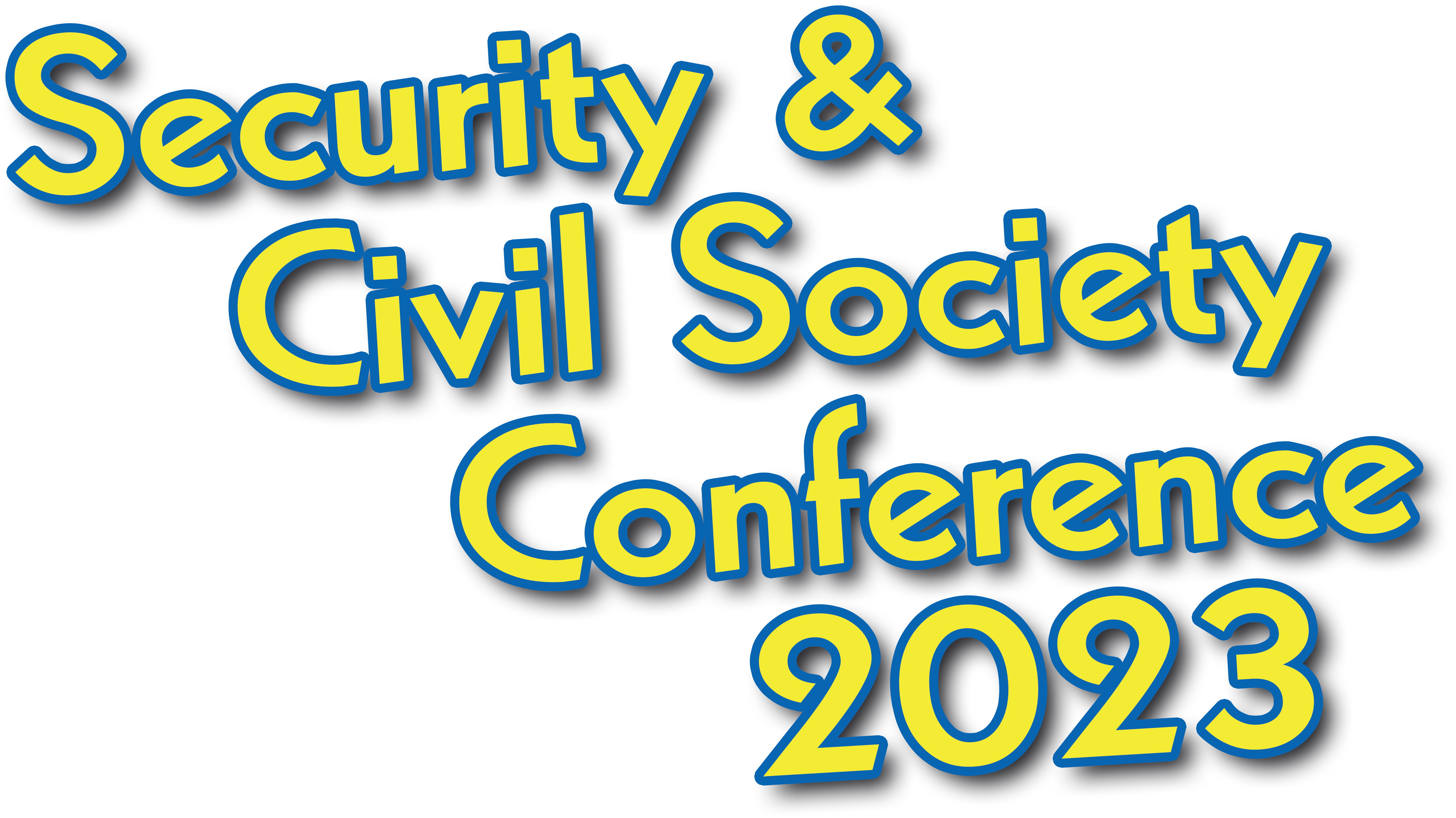The project „Security and Civil Society Conference 2023“ is supported by the European Regional Development Fund (ERDF) through Enterprise Estonia with 30 000 euros.

The Security and Civil Society Conference 2023 will bring together interested politicians, individuals, representatives from public, private, and civil society sectors whose work is connected directly or indirectly with European security, civil society and United Nations Sustainable Development Goals.
The aim of the conference is to explore possible solutions for stabilising European security, improving people’s cognitive security and supporting the achievement of the UN SDGs in the area of the green revolution, security and digital cooperation.
Additional objectives include:
- Additional objectives include:
- To explore how to use digital technologies to promote and engage communities and individuals to help achieve resilient society targeting peace and human rights protections;
- To identify how UN SDGs may be implemented on a local and international level;
- To share practical skills on how to utilise the existing international peace, green economy and digital instruments to improve security, energy and climate policies, sustainability of society and develop better tools for good governance and dialogue within regions.
- To support further development of Green Habito network and empowerment of stakeholders, government representatives and other relevant organisations to implement the outputs of the International conference and contribute to dialogue and peace process in Europe;
- To support implementation the outputs of the conference Narva Declaration together with local Citizens’ action plan;
As a result, the Narva Declaration will be finalized and approved, together with proposals for a specific solution for the civil society sector on how to cope and promote their work during the crisis.
The international event is open to all interested individuals, representatives from public, private and civil society sectors, including CSOs and youth organizations, educational institutions, academics, researchers, legislators, planners and policy specialists in all relevant areas, representatives from International organizations, governments, ministries or departments, international donors, national and regional human rights institutions.
The program will consist of plenary lectures and speeches, panel discussions, workshops, study visits, a round table, and World Café discussions involving all participants. Participants will be expected to share their experience – and emphasize to younger participants their perspectives on the ‘art of the possible. They will also be expected to deliver targets and action ideas for implementation at local, national, and international levels. The focus will be to contribute effectively to build European Civil Society resilience – and get educational and political institutions, communities, and individuals involved back in their home countries.
The Conference topics will cover for example on
- Charting Ukraine’s Future in Europe as free, democratic sovereign state” / “Moldova’s Future: East, West, or Somewhere in the Middle?”: As International community and CSOs affirming the vital importance of having their number intricately involved in efforts to rebuild Ukraine’s infrastructure and institutions, and contribute to sustainable reforms; not just as watchdogs, but as true partners throughout the process, where each party could make own valuable contribution. Despite the rapidly changing reality and the upcoming geostrategic changes, we will try to present a positive agenda for the development of events for Ukraine and the world community in achieving peace throughout the internationally recognized territory of Ukraine. To understand Moldova future we need to be able to understand existing factors and challenges what country and society are facing including internal and external actors who play the leading role in the future of Moldova. Will the global powers enable to support the UN to be more effective at promoting peace and preventing conflict, through enhanced peace-keeping and conflict transformation;
- “Mainstreaming more conscious Nordic-Baltic security policies to becoming NATO members and supporting sustainable development to become the world’s most sustainable and integrated region in 2030”: The Nordic countries share a common security environment, and are engaged in close foreign, security and defence policy cooperation. Nordic foreign, security and defence policy cooperation has deepened further in the past few years. The Nordic Defence Cooperation (NORDEFCO) is a good example of the closer cooperation. With Finland and Sweden as NATO members, the threshold for using military force in the Baltic Sea region will rise, which will enhance the stability of the region in the long term. NATO is a stabilising actor in the Baltic Sea region and from Russian perspective not at all. In 2022 the war in Ukraine has affected the world – as hard security as the digital sphere – in unforeseen ways. The intentional destruction of infrastructure in Ukraine, including digital infrastructure, illustrates the need for resilience in communication networks in order to prevent the risk of regions being isolated. It also demonstrates how important it is that we can rely on our communication networks to ensure availability and continuity of essential services for our citizens. In addition to the cyber-attacks in Ukraine, we have also seen a growing trend of organized cyber-crime on an international level. Therefore, a high level of security in the digital services that our societies rely on, has become increasingly important.
- “Global powers, region states and civil society contributions in Mediterranean region for peace, security and sustainable development”: The Mediterranean region continues to struggle with terrorism. Countries like Turkey and Egypt are still facing violent acts perpetrated by radical groups, a situation which affects the European security environment as a whole directly and indirectly the threat of terrorism emanating from Europe’s southern periphery. These risks are hardly new, but they have acquired new meaning in light of the sustained conflict and political instability around the southern and eastern Mediterranean, and the persistent economic and social pressures across southern Europe. Above all, terrorism concerns and counter-terrorism partnerships will underscore the strategic importance of the region on both sides of the Mediterranean at a time of flux in national, NATO and EU strategies. Mediterranean security environment as a whole will continue to be strongly affected by this threat, and the continued recruitment of terrorists throughout the region. State fragility in the Euro-Mediterranean regions and possible intersections of terrorism with systemic security issues in the global sense, including climate change, maritime issues, and migration will be addressed alongside the wider dimensions of military issues, including the presence of major powers naval units in the Mediterranean and how each country views the other’s long-term regional ambitions.
- “Climate Change and Energy crises: Green Revolution still achievable by 2050? – Transforming global consumption patterns and investing in clean energy – As electricity prices surge on the back of dwindling gas supplies from Russia, calls are growing to bring relief to European households and businesses – some of which are being pushed to bankruptcy. The calls are being heard as EU energy ministers prepare to hold an extraordinary meeting to discuss the EU’s response to the crisis and of course to keep in agenda green revolution what EU agrees to achieve by 2050. Experts will provide own perspective on existing crises and update of EU policies.
how to enable the UN to be more effective at promoting peace and preventing conflict, through enhanced peace-keeping and conflict transformation operations, intercultural dialogue, youth exchanges and international digital Citizens’ Assemblies on key UN decisions. Additionally to the European security problem we will look into sustainable growth, energy crises and digital integration.
The working language is English. Arabic translations will be provided.
The conference sessions will be streamed live on social media (https://www.facebook.com/) as it will be a hybrid event.











